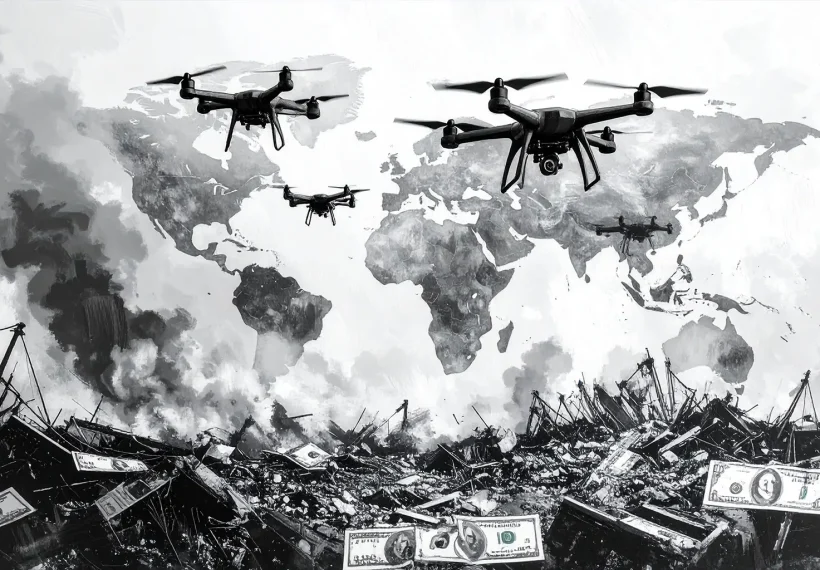“American civil war”
Image extraction: Firefly
I wasn’t able to make satisfactory trades during the COVID shock, and I’ve reflected that this was because I lacked the fundamental and crucial mindset in investing: “mental preparation and scenario planning.”
Overwhelmed by the global pandemic, my thinking froze. Facing stock prices that seemed to keep falling endlessly, I couldn’t even take small test buy positions, let alone short positions. It was pathetic.
From that reflection, I decided to prepare scenarios for as many situations as I could think of. This time, it’s a U.S. civil war.
America once fought divided between North and South, but here the background leading to a fight between blue and red, conservatives and Democrats, doesn’t matter. In fact, whether it actually happens or not is unknowable at this point, and not important here.
What matters more is considering the economic impacts, particularly on investments.
If such a thing were to happen, stock and bond prices would move for reasons unique to that civil war. But rather than the unpredictable, I want to focus here only on general tendencies.
Regardless of scale or duration, it comes down to the very general notion of “when a civil war breaks out in a country, usually….” The point of this post is to avoid being in a situation where I can’t even sketch out basic price movements for stocks and bonds, like during COVID or the Russia–Ukraine war. That level of depth is sufficient.
Well, there’s virtually no chance of a civil war happening in the U.S., but the scenario can also be applied to other countries.
Case Studies: Lebanon, Yugoslavia, Libya, Syria
As case studies: Lebanon from 1975, Yugoslavia from 1991, Libya and Syria from 2011.
Obviously these countries differ drastically from the U.S. in many ways—geography, history, social structure, and above all, their role in global finance and the economy.
Though the differences are vast, I still see value in looking at their cases, because what I really want to see is investor psychology.
Investor psychology—how they react in times of crisis—can be referenced across different economic scales. Even if only broad tendencies emerge, that’s useful enough.
For simple research like this, I naturally asked AI. This time, claude.ai.
To roughly summarize the impact on the country’s market in summary…
1. Syrian Civil War (2011–)
– Damascus Securities Exchange effectively halted after outbreak
– Government bond market nearly ceased functioning
– Neighboring countries:
– Lebanon and Jordan faced refugee-driven economic strain, stocks fell
– Turkey was initially hurt, later benefited as an alternative market
2. Libyan Civil War (2011)
– Tripoli Stock Exchange completely suspended for a time
– Government bond prices collapsed, effectively defaulted
– Neighboring countries: Egypt and Tunisia’s stock prices fell in tandem
– Energy companies were especially volatile
3. Yugoslav Wars (1991–1995)
– Belgrade Stock Exchange functionality severely degraded
– Government bond market essentially collapsed
– Neighboring countries: Austria and Hungary saw temporary stock declines
– But politically stable nations recovered as safe destinations
4. Lebanese Civil War (1975–1990)
– Beirut Stock Exchange completely shut down in 1983
– Government bonds effectively defaulted
– Neighboring countries: Cyprus rose as an alternative financial hub
– Jordan and Kuwait’s financial markets benefited
The results are unsurprising. Commonalities:
– Financial markets in civil war countries fall into dysfunction
– Nearby countries are affected, though political stability makes a major difference
– Alternative markets tend to rise
– Energy and resource firms are especially affected, though unclear if this is due to the Middle Eastern context.
In short: civil war brings stock market collapse, bond collapse, currency collapse, and often drags down neighbors.
Response to a U.S. civil war
Therefore, if news of such a conflict surfaces, preparation for full withdrawal from U.S. stocks, bonds, and the dollar is necessary. At least in the early stages, a complete pullout is the safer move.
Markets may suspend trading, so quick action is required—though I lack confidence here.
One should also exit Canada and Mexico investments. North American logistics would be in shambles.
Where to flee? Precious metals like gold and silver. Bitcoin will likely move in tandem with U.S. equities, so best to wait.
Physical state of financial centers also matters
As of September 2025, I infer that if a civil war broke out, it might be between an East/West Coast alliance backed by international opinion versus a central bloc.
In such a case, how well New York, the financial hub, escapes the conflict would also influence outcomes.
If buying stocks at all, it would be defense industry firms.
What it means for U.S. financial markets to stop functioning
Even temporary closure of American exchanges would have massively destructive global consequences.
First, G7 and other advanced nations’ stocks and bonds would plunge.
Currencies, especially dollar pairs, would swing wildly—too volatile to trade in the short term.
Even China, a U.S. rival, would suffer huge negative impacts due to economic interdependence.
Alternative markets
Depending on how weakened the U.S. becomes, China might attract capital, but so would Europe.
As seen during President Trump’s high-tariff era, Europe serves as a strong alternative when the U.S. falters. Investors fleeing the U.S. often turn to Europe.
Thus, Europe, perhaps the U.K., would likely gain attention as an alternative market.
Summary
– If civil war breaks out in the U.S.: total withdrawal from U.S. stocks, bonds, and the dollar.
– Shift to precious metals like gold and silver.
– If buying stocks, focus on defense industry.
Then, depending on conditions, watch for U.S. stock, bond, and dollar bottoms.
Alternative investment in Europe should also be considered, though remember power shifts occur slowly over decades.
In past scenario analyses (e.g., WWIII, global depression), I could assume partial buy-ins after U.S. stocks fell 30–50%. But in a U.S. civil war scenario, the only conclusion is temporary full withdrawal from U.S. investments.
Civil war is a form of “self-destruction” for a nation, different from wars with others or economic issues—that’s why withdrawal is necessary.
And to repeat the obvious: I hope such a war never happens. I don’t want to worry about the safety of friends in NY or LA. And, above all, it almost certainly won’t happen.



